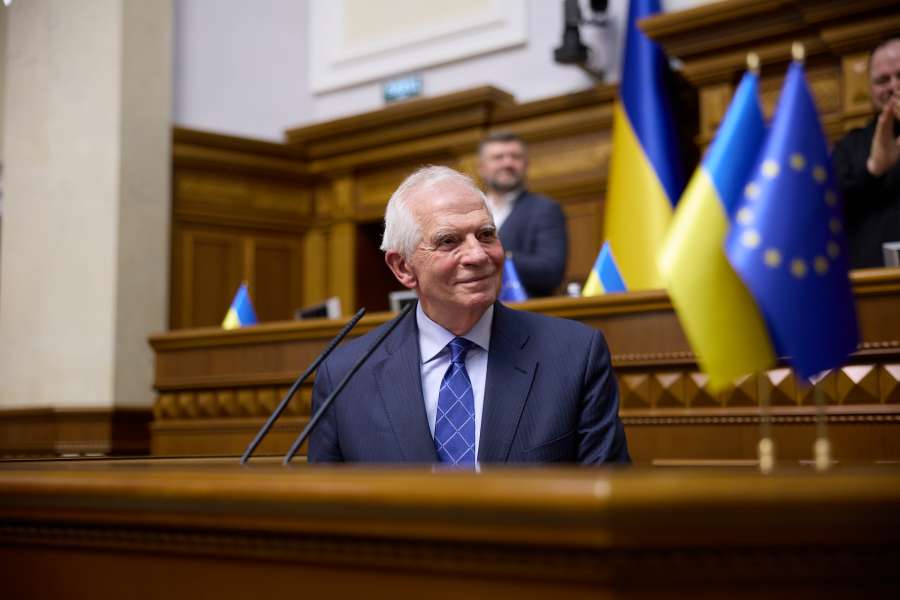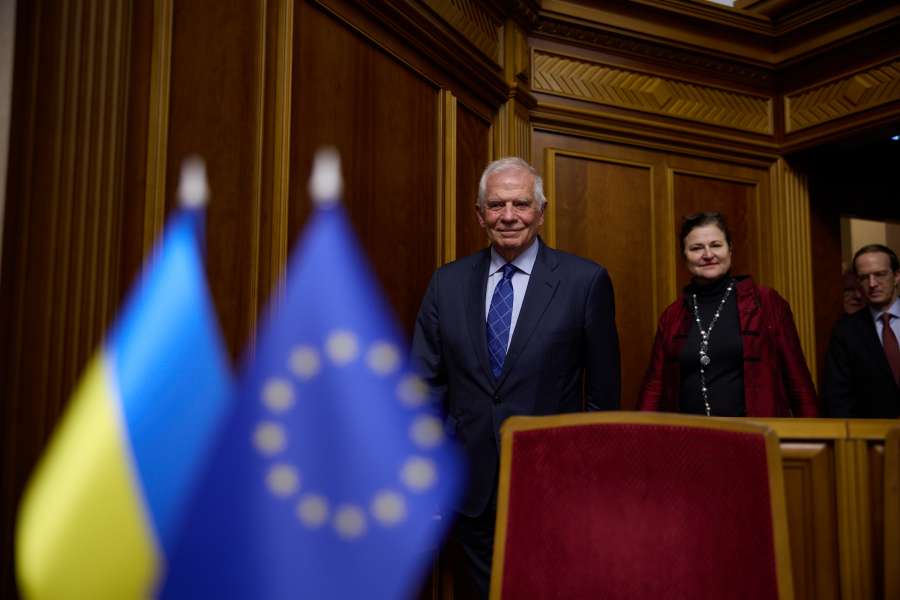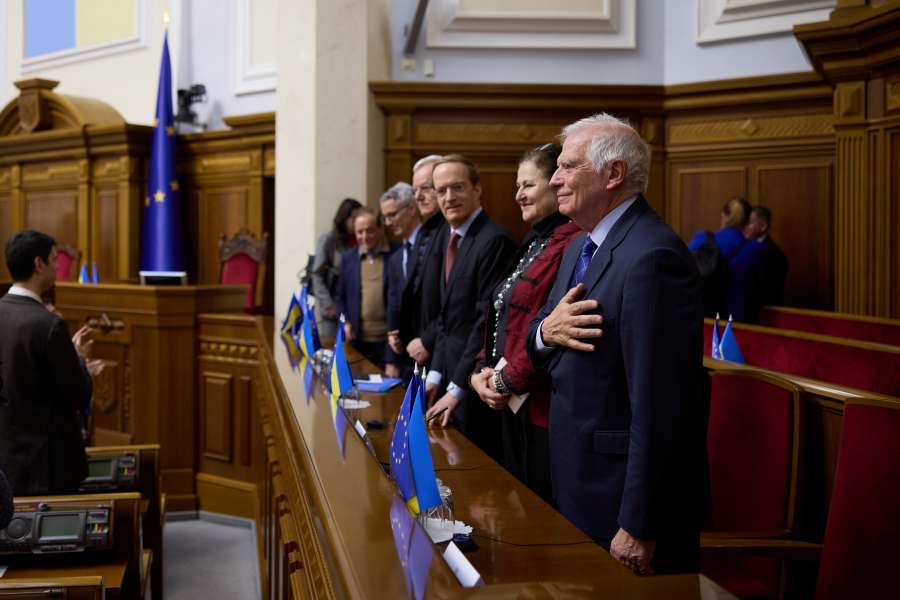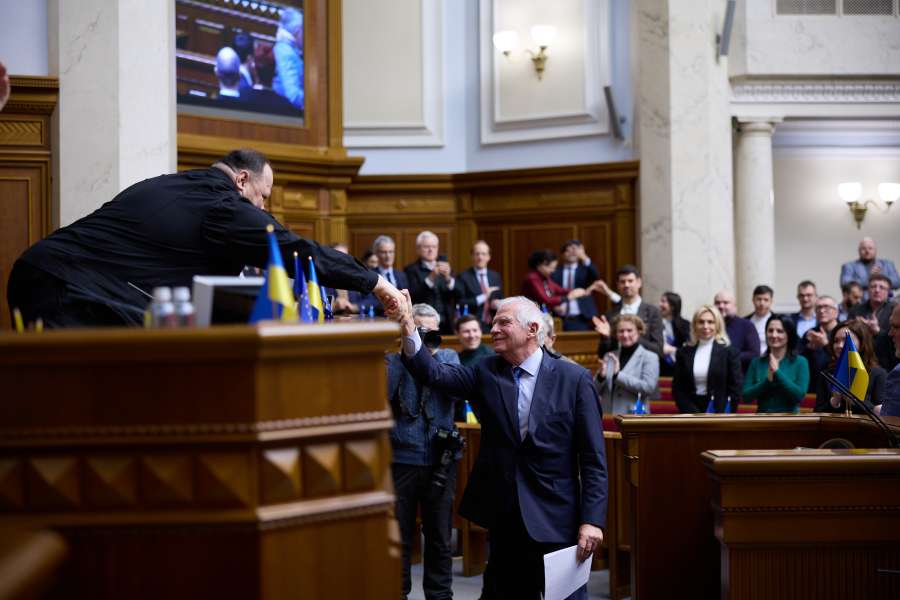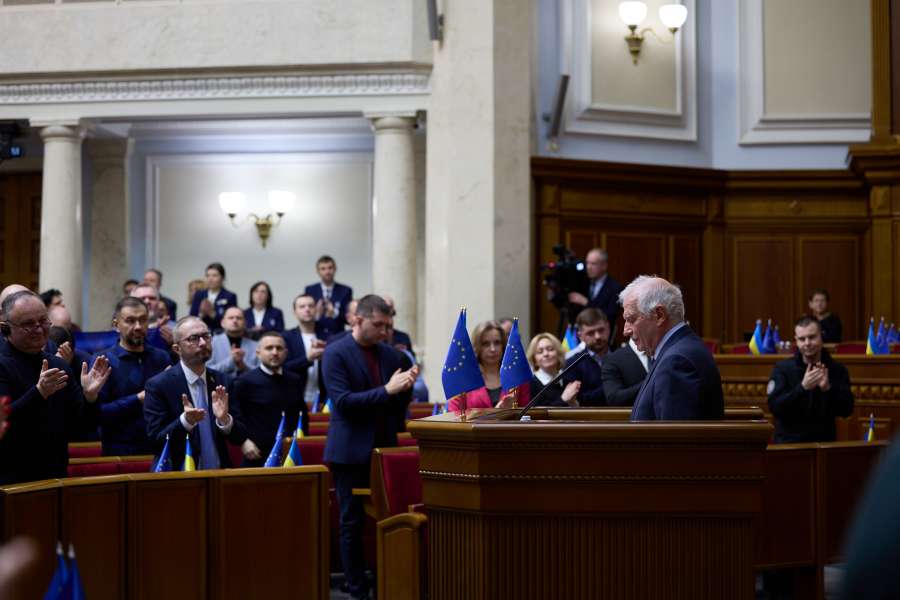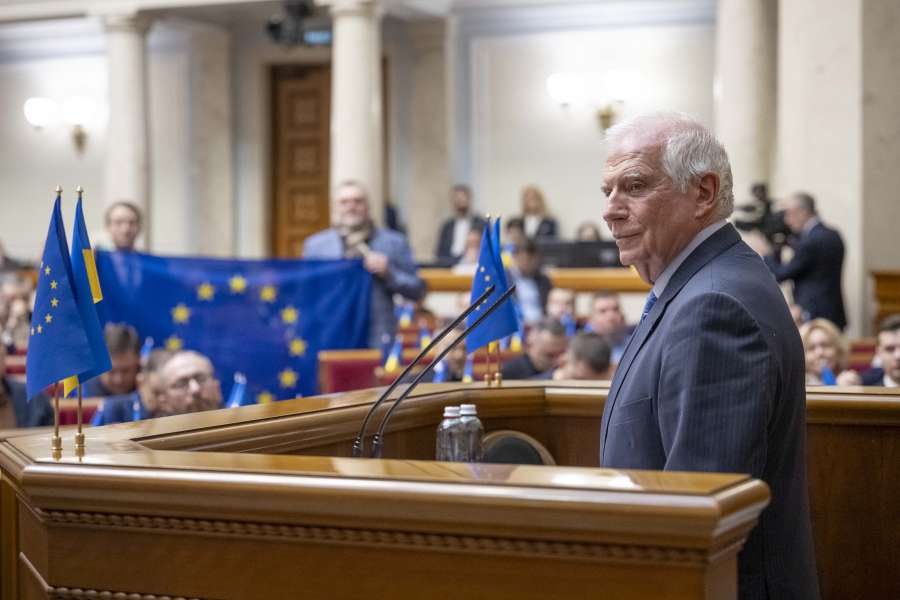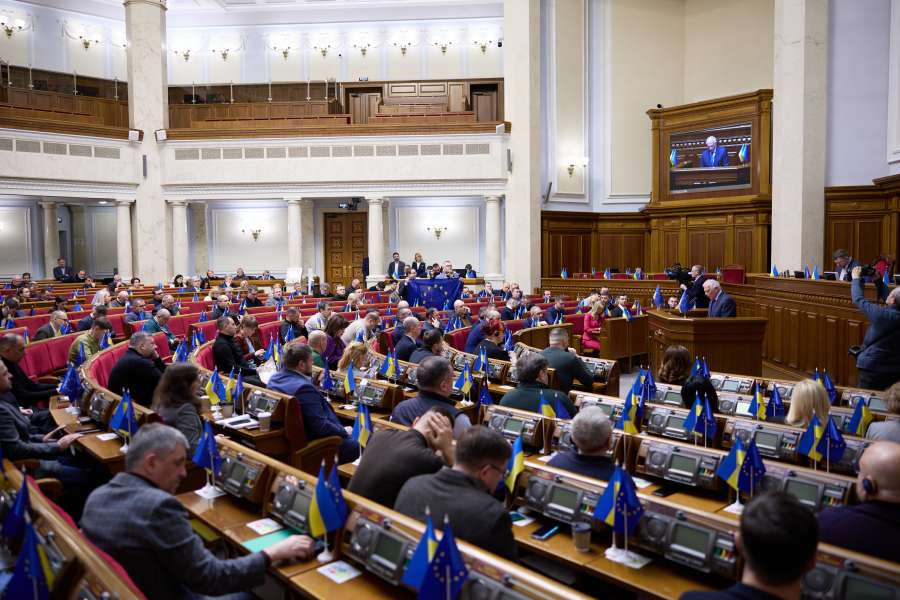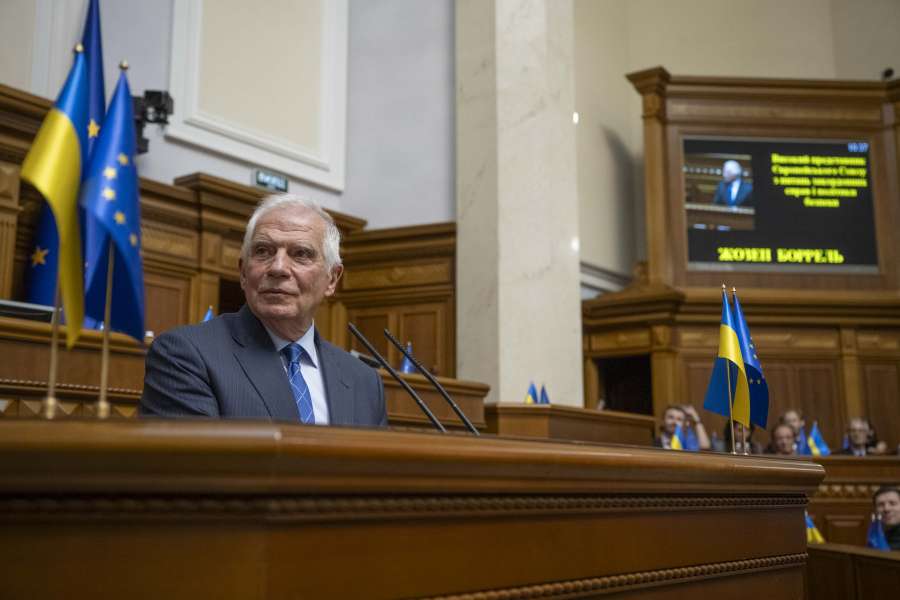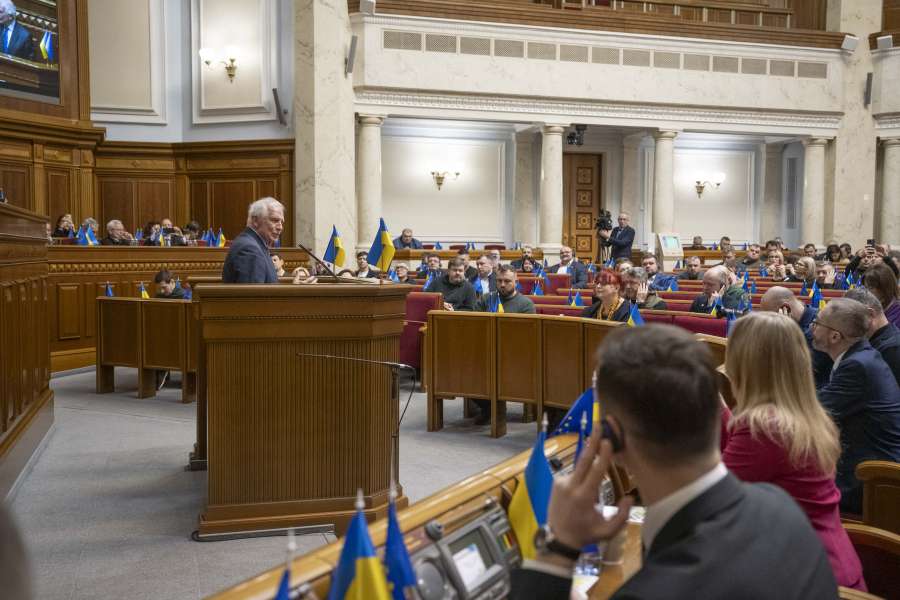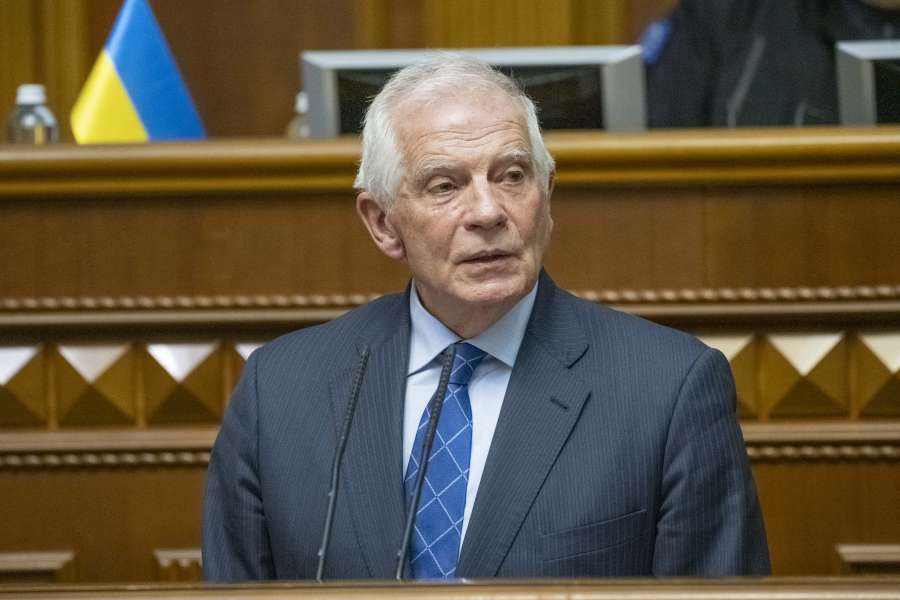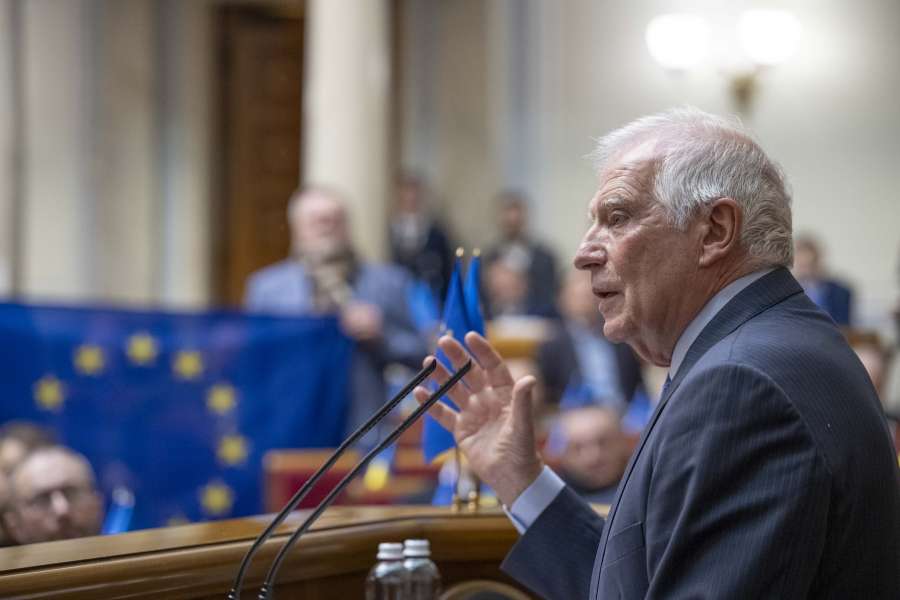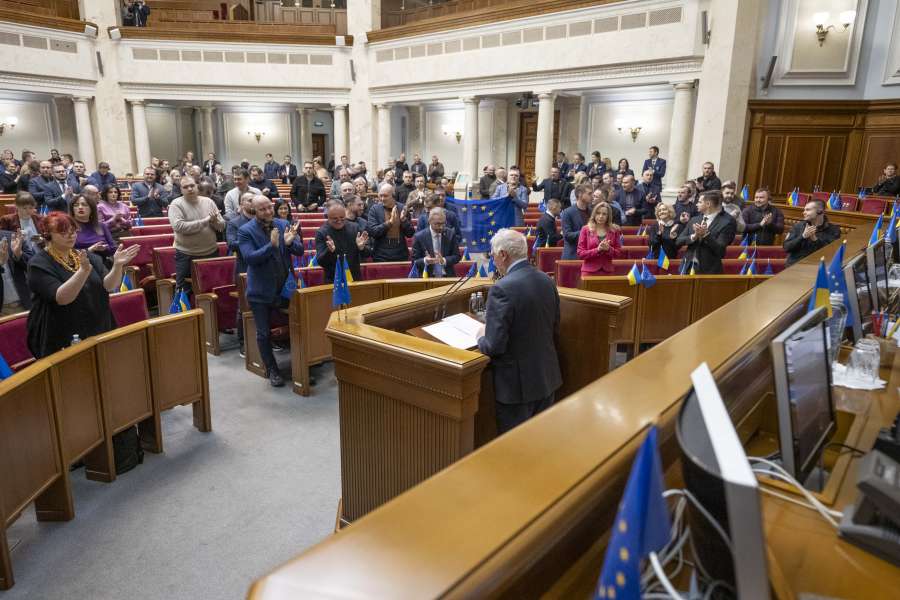Mr Speaker! Distinguished members of the Verkhovna Rada of Ukraine, ladies and gentlemen! It is a great honour for me to be with you once again. And I thank you for the flag of the European Union.
I have come to Kyiv again. This is my sixth visit and my fourth visit since the beginning of the full-scale war. This is a city that has been more aware of its European identity over the past ten years than other capitals on the continent. As Yurii Andrukhovych wrote, and his books are now being translated into many European languages, Kyiv has won the casting call for the script of the best revolution of all – the revolution of Kyiv, the Revolution of Dignity. We have just celebrated the tenth anniversary of this revolution – the Revolution of Dignity, as it sounds in your language.
I am well aware that you have paid a heavy price for this Revolution and continue to pay it. Because a large number of heroes of this Revolution later died at the front, defending your freedom from the russian occupiers. For example, Roman Ratushnyi, an anti-corruption activist, also died, he was not even 25 years old...
Some of your soldiers have been fighting on the frontline for about two years now. putin hoped it wouldn't last a week, but two years later they are still there. These are the heroes of the battle for Kyiv, when russia was stopped eight kilometres from this building. These are the heroes of Kharkiv. And everyone in Europe already knows about it. You did this with only old soviet equipment, because there was no Western help. You acted through the motivation of your people, you liberated half the territory that russia occupied, and you unblocked the Black Sea.
In every liberated city, your people, your soldiers, welcomed them with joy. And that joy was as strong as the suffering you had endured. This was the case in Bucha, I saw it. They saw death, they saw destruction, they saw open mass graves. The war took a lot of people. But let me mention a few.
One of them is Viktoriia Amelina. She is a finalist and winner of the EU Prize for Literature. She worked and contributed to the investigation of war crimes. Instead of seeking safety somewhere, she travelled to the east to capture the story of people who lived under occupation forever. But a russian missile, just like the missiles flying at Kyiv today, killed her while she was having dinner at a popular pizza restaurant. She was not a military target, she was only 37 years old. She left us too soon, as she wrote herself. I cannot remember everyone. All those victims, all those heroes of this war, because there were too many tragedies, like the death of Viktoriia Amelina, and they remind us what Ukrainian people are fighting for.
Ukrainian soldiers know what they are fighting for: they are fighting for their land, they are fighting for freedom, but russia does not know what they are fighting for. They are fighting for their very existence, for their loved ones, for their children, for freedom and culture, so that the Ukrainian language does not fall silent, so that books like Viktoriia's do not remain unfinished.
Do you know where the real border is? It's the border between Ukraine and russia, the conditional frontline. It is not only a battlefield, it is also a political frontline between a world governed by law and a world where powerful people impose their will on society. It is the frontline between democracy and authoritarianism.
Ukraine will have the advantage in this war of attrition, and it will be a significant and important spectrum for Europe. I know that we owe you in this fight, we owe you because it is very important for the security of Europe. This is not just a rhetorical statement, it is a reality, because the security of Ukraine is a huge contribution to the security of Europe as a whole. And the best thing we can do for Ukraine is to make Ukraine part of the European Union.
Let us recall what the European Union is. It is not a military alliance. The European Union was built around economics, around resolving conflicts through negotiation and compromise. It worked after the two terrible world wars of the last century, and peace reigned in Europe for at least 80 years. Empires disappeared, borders turned into something invisible. And that's why, perhaps, some Europeans have forgotten that a world where power prevails can be terrifying.
It is important to understand that geopolitical aspects continue to emerge in the world, that russia has not forgotten its imperialist illusions. That is why your war was the moment after which Europe woke up. It woke up on 24 February 2022. And for many of us, it was about a fundamental change of mind and thinking. It was the moment when we all woke up and realised how horrible, how violent our world is. It changed our minds. Now we need to change the European Union institutionally in order to adapt to the new geostrategic reality. Because we need to face the challenges that we have.
Two years ago, I was in Donbas. It was 6 January and russia was already amassing its troops on the border. I met with the Prime Minister (ed. – Denys Shmyhal) and he asked me: if they invade Ukraine, will you support us? Will you give us everything we need to defend ourselves? I will never forget this question, I will never forget that moment in our lives. He asked: will you help us? And at that time, I could not give him a clear answer because the European Union had never provided military assistance to a country at war before. But when the invasion started, we responded, we responded in an unprecedented way. And at the moment, we remain united: we have provided – this is a reality, not a promise – 28 billion euros in military aid and 90 billion euros in total aid. Last week, the European Union member states agreed on another package of 50 billion euros of European aid to ensure that you have predictable funding, that you pay salaries and pensions. Because you need to win both war and peace at the same time.
Let me also say that the President of the European Commission, Ursula von der Leyen, and Charles Michel also deserve to be thanked, because they have worked very hard to get this decision adopted by the member states. Now the decision has to be taken by the Parliament, the European Commission has to approve it, and it will happen by the end of this month, I assure you of that.
But I know that more is still needed. This is, as I said, my sixth visit to Ukraine. We need to change the paradigm from providing support to Ukraine as long as it is needed to another paradigm – to provide Ukraine with everything it needs. Not as much as necessary, but everything that Ukraine needs.
The issue here is not the duration. I would say the sooner the better. And for it to be faster, it should be more significant: everything Ukraine needs to win. We need to refute the challenges and claims that Ukraine cannot win.
Some people say, why continue to support Ukraine if Ukraine cannot win? This is not true! russia has lost many wars in its history. And to those people who say that western support will not last long – I am weighing my words now, standing here in front of the representatives of the Ukrainian people – and I want to say that those who say that we need to somehow reconcile with putin are wrong. They were wrong in '22, and they remain wrong today. Because, in fact, putin himself has declared that we want to end this conflict as soon as possible, but on our terms. And what are those terms? Denazification, demilitarisation or destruction? This is putin's recipe for Ukraine. And what does it mean? It means one word: “surrender”. He has consistently demonstrated that he will not negotiate in good faith, and he does not honour those agreements. He has clearly said that this war is against the entire West. So, instead of reconciliation, we need to remember the lessons we have learnt since '22, we need to avoid repeating mistakes and increase efficiency in the areas where we have seen success.
Let's face it. russia made no progress on the battlefield in '23. Ground forces, your troops have successfully undermined russia's air dominance. You have ended the blockade of the Black Sea, you have forced russia to withdraw the vast majority of its fleet from the occupied Crimea, you have resumed grain exports. The grain blockade was ended not because of agreements, but because of your struggle. In addition, it was achieved through the Solidarity Lanes programme, which also played an important role in the issue of exports from Ukraine. And your people, they continue to fight, they continue to fight, showing great ingenuity.
Two years ago, there were seven drone manufacturing plants in Ukraine. Today there are hundreds of these plants. I visited two of them yesterday and what I saw was revolutionary. Not because someone told me so, but because I saw it with my own eyes. I saw how young people show great ingenuity, how they use their technical skills, how they turn factories into high-tech facilities. For example, a drone that costs 300 euros can destroy a tank. The Ukrainian ingenuity is incredible when I see the factories that are working and the people who work there, these young engineers who create new tools, new means. When this war is over, Ukraine will be among the leaders in drone production. So, I want to congratulate you for having such young people.
At the same time, russia is, let me put it this way, cannibalising its own future. putin has mobilised the entire economy, society and political system for war. Talented people are leaving the country if they can, and the demographic situation continues to deteriorate. However, we have to note that they have adapted to the war and their economy has been more resilient than we expected. We have to face the reality. Yes, the sanctions are affecting the russian economy and their war effort, and they apply to two thousand entities and individuals. For example, we no longer have energy dependence on russia. But now we are fighting against the circumvention of these sanctions. This is a complicated process. However, we see that it is gradually but effectively working. We focus on blocking the re-export of goods that can be used on the battlefield. This is our daily work. But we also need to quickly rebuild the European defence industry.
I know that you expect more military support from us, more ammunition, more of everything. But for the last two years, the vast majority of military support has come from existing stocks that we had in our warehouses. So replenishing those stockpiles and continuing to supply you with weapons and ammunition is a significant challenge for our defence industry, which has been shrinking or declining during peacetime. But we have already reversed this trend and the production capacity of our defence industry has already increased by 40 per cent since the beginning of this war, and we are now producing 1.4 million rounds of ammunition a year.
I am well aware that your ammunition needs are greater. I have spoken to your military and I know that you need more, but we are working hard and we will deliver one million rounds by the end of the year. This is in addition to the ammunition that is being sold to you in Ukraine. Because there are two ways of supply. We are only talking about the transfer, which is free of charge. But in addition to that, our industry produces the same amount of ammunition for you. I can't tell you the exact name because we are living in a time of war, but we should take into account not only what is transferred in the form of support, but also what is transferred in the form of exports. And we are now giving priority: we are telling our armed forces that you can wait; we are telling our customers in third countries that you can also wait, the priority is now with Ukraine. So, if you take into account, you need to add up the amount of what is transferred as aid and what is transferred as exports.
We have reached an important milestone in military assistance – 28 billion euros. For this year, member states are planning more than €20 billion in military assistance, either bilaterally or through the European Union. You know these figures, but I want to remind you once again that the public also knows about our assistance.
But there is one more battle – the battle of narratives, the battle of minds. We need to fight not only on the battlefield, but also among minds. A global battle of narratives, and I am also responsible for this battle, because the rest of the world's perception of this war will be crucial to isolate putin, to make our sanctions work. Because people in southeast Asia, in Africa, in other parts of the world need to understand the root causes of this war, why it is being fought, why you are defending yourselves. Because for the rest of the world, the defining historical experience was colonialism, which prevailed in some parts of the world. We were colonial countries. But there is a paradox that for some reason russia is not seen as an imperialist and colonial power, while it is. We have to counteract the russian narrative. This war is not a war of the West against the rest of the world, it is not the West against the rest of the world. This is a war for the sovereignty and territorial integrity of Ukraine. This is a war to defend the principles of the UN Charter.
Because the world is becoming more transactional, when universal principles are even more important than ever. They need to be protected, they need to be understood, so that both leaders and the public understand them. That is why the Ukrainian Peace Formula is the only comprehensive mechanism for ensuring a just and lasting peace today. Because it is prepared on the same principles – the principles of sovereignty and territorial integrity.
In order to counter russian, anti-Western propaganda, we need to be consistent with our principles, and the same compliance with principles should be in the world, so that there are no double standards. Frankly speaking, I am not sure that we have always been so committed. That's why we in the European Union, and I personally, have been working so hard to end the tragedy, the suffering of the civilians in Gaza, to ensure the release of the hostages in Hamas, and again to work towards a solution between the two sides, which the international community is working towards.
And the European Union wants to ensure that power does not determine who is right and who is wrong. So that powerful countries do not see less powerful countries as prey, because putin's strategy should not succeed. Because if it succeeds, then russia and other autocratic regimes can plan something similar against their neighbours. russia is the last colonial empire in Europe, it's such an anachronism. And the russian writer Mikhail Shishkin wrote in a letter to an unknown Ukrainian: “My country is a country that has fallen out of time.” russia remains an imperialist power that is unable to separate itself from the colonial vision of its identity. And until this question of russian identity is resolved, it will remain a threat to all its neighbours and Europe. In fact, Vaclav Havel said that russia does not know where it begins and where it ends. And if a country does not know where it ends and where it begins, it creates huge challenges for its neighbours. And putin confirmed this, and he said, in his propaganda for the next election, he said that russia's borders do not end, there is no end to russia's borders.
As long as russia does not resolve this issue, as long as its political system remains as it is, it will remain authoritarian, nationalistic and, unfortunately, violent. And no one knows this better than you, Ukrainians, because for centuries you have been at the forefront of this russian imperialism, you have been called malorosy, you have been starved to death during the Holodomor or deported to siberia. And russian imperialism remains a brutal reality, and putin is obsessed with his fantasies about historical russian lands.
You, Mr Speaker, have shown me maps from 1660 and the 17th century, where you can clearly see the Ukrainian territory.
We see repression of the language, oppression, we also see the forced adoption of thousands of Ukrainian children in order to russify them and make them forget about their Ukrainian roots, their parents and families. But you are no longer a vassal of the empire, you are not an object, you are a subject, Ukrainians are masters of your own destiny, you have demonstrated this many times throughout history, a history in which we will write a new chapter together.
And now I would like to turn to Ukraine as a member of the European Union. Dear deputies, we have decided that your future is in the European Union, that is what you want – and the leaders of the European Union agreed on this last December, and now we need to implement this decision. These should not be just words, these are powerful decisions that need to be implemented. But you also have to do your part, you also have to work. You have made the choice in favour of Europe many times, and I understand that. When I was a young Spanish man, there was a dictatorship, Europe was a beacon of democracy and economic prosperity for me, and I saw it on the Maidan ten years ago. There was a sea of yellow and blue flags, the yellow and blue flags of Ukraine, flying among the European flags – today I see this European choice of political forces, civil society and entrepreneurs. But this choice must be preserved, unity and consensus must be preserved, because they will be very important on your way to membership. It will take a lot of work, it will take a lot of compromises on your part, on the part of the Council, on the part of the Government, on the part of citizens, industry, civil society, it will take a strong and comprehensive modernisation of your governance, your economy and your society. With Ukraine, the European Union will be different and Ukraine will be different, but it will take some effort. Of course, we will support you on this path, but you, like any other candidate country, have to implement all the rules of the European Union.
Let me be very clear: corruption has been a weakness in Ukrainian society for many years. This has caused significant gaps in your development for 30 years – and the President Zelenskyi was elected with a mandate to fight corruption. And the recent progress in the field of law, in the field of law enforcement, it is already evident, because there is an actual improvement in the Transparency International Corruption Perceptions Index, and this really shows that the situation with corruption is improving, and this should encourage you. But there is still work to be done, because corruption undermines the effectiveness of military operations and the effectiveness of reconstruction. Just as it undermines the support you get from the European Union member states. This process of accession must be accompanied in the coming years by strong reconstruction measures. And these processes must go hand in hand. When you rebuild your houses, your roads, your bridges, your ports, they have to be rebuilt in accordance with European standards, in particular, energy efficiency standards. But there is one more important element of infrastructure, and this is the aspect of infrastructure that may be even more important, but it is invisible. This is the “invisible infrastructure” that holds democracy together – the rule of law, pluralism and inclusive governance.
This should be obvious, yes, it is not some kind of party message. It should be obvious to everyone – separation of powers, respect for human rights, social cohesion and equality. This is the invisible infrastructure that makes unity possible, the foundation of a democratic society. It is very difficult to build, harder to build and maintain than roads, bridges or ports. However, I am well aware that it is very difficult, and even more difficult to do in times of war. That's why I said that you need to win in all directions at the same time.
Of course, there is a temptation to centralise power and restrict freedom of speech. Yes, in times of war, the system of checks and balances is more important than ever. But respecting the rule of law and promoting democratic dialogue between the government and the opposition will increase your resilience and ability to win this war.
Dear parliamentarians, if we are talking about a democratic and inclusive society, this is your biggest advantage over putin's dictatorship, because you are opposing a dictatorship, you have to demonstrate that you are a pluralistic democratic society. There is a popular saying in Ukraine: “Where there are two Ukrainians, there are three hetmans”. In Spain, we say that for every four Spaniards, we will found five political parties. So, we are well aware that pluralism sometimes creates organisations that are difficult to manage. But pluralism is something that is very inherent in European society, it is our strength and it is something that putin will never understand. He will never understand that, in fact, this is what creates the difference between a democratic and an autocratic regime. And you know, I was President of the European Parliament, so I know what a parliament is. It should be a forum where this pluralism exists, where this power is used. It should be a forum for discussing reforms, it should be transparent, it should guarantee representation of all groups of society. Similarly, when would you agree on when and under what circumstances to hold elections after martial law is lifted? It would be a very important condition and it would be a very important signal for the country and for the whole world.
Before arriving in Ukraine yesterday, I checked the number of alarms that have been raised in Ukraine since the start of the russian full-scale invasion. I counted over forty thousand alarms. Forty thousand alarms when Ukrainian people had to run to the shelters, as we did this morning. Forty thousand times families had to run to shelters. Forty thousand times when children were reading in that shelter. This is 55 alarms a day in such wonderful cities as Kharkiv, Dnipro and Lviv.
We come from abroad, we come and then we go home, but you stay, you stay under such pressure. And next year, after the European elections, a new generation of European leaders will be boarding trains. And these trains, by the way, are never late, despite the bombing, they brought me safely to Kyiv. And these trains will continue to bring visitors to you.
But I am sure that this new generation will stay with you throughout your process, throughout your journey to the European Union. And this is such a very important message that I would like to send. We know very well that our own security is defended by you on your eastern borders.
And when we say “for our freedom and for your freedom”, we mean that we are grateful to you. We are grateful to you because you have already made a lot of sacrifices. This is not about fatigue in this war. The only one who could theoretically get tired in this war is you, but this is not happening. The war is won by motivating people.
How many wars can be won if there is no desire, if there is no motivation? Wars were won because people knew what they were fighting for. Look at what is happening in different countries around the world – from Afghanistan to the war in Spain against Napoleon. Motivation was important there, and it was important to understand what you were fighting for. And as long as you don't get tired, there is no chance for us to get tired.
Glory to Ukraine!
